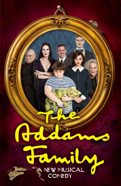What's Up, Andrew Lippa? The Tony-Nommed Composer Talks Nathan, Bebe and Bringing The Addams Family to Life
Thanks to television, The Addams Family has an instantly recognizable theme song, but for the beloved cartoons to evolve into a Broadway musical, there needed to be more than just some "snap, snap." Enter Andrew Lippa, author and composer of the 2000 off-Broadway version of The Wild Party, and now a 2010 Tony nominee for making the Addamses sing. We talked to Lippa about becoming part of the gothic family, working with stage legends Nathan Lane and Bebe Neuwirth and the Broadway show's instant success.
The characters in The Addams Family are iconic. How did you originally approach this show?
Going in, I had this idea that they were dark and brooding characters. But if you look at the original comics, Gomez and Morticia are always smiling. They see the world in that inverted way, but with a great amount of joy. They look forward to blowing up things, but they’re never malicious. We wanted to find out what makes them actual people. The word we underscored was “family” because it turns out they love each other just as much as we love our families.
Each family member has such a distinct personality. Was it hard to write for so many characters?
Early on, we determined Uncle Fester would be a narrator with an old-fashioned vaudeville quality. Once we did that, I realized each character should have its own musical voice. They’re all slightly disconnected, but how they come together is part of the story. Wednesday sings in a much more contemporary voice. Her song “Pulled” has a nod to the All-American Rejects’ song “Gives You Hell.” Gomez has a slight Errol Flynn quality, so he’s often followed around with a Spanish guitar. I always felt like Morticia had a bit of a gypsy quality.
Did you have a favorite character to write for?
I don’t want to make anybody else feel bad…one of those characters will call me up, I guarantee it! I loved writing for Pugsley. I think I have a lot in common with him. I was a fat little kid myself.
Once Nathan and Bebe were on board, did you start writing specifically for them?
I had two finished songs at [the time of their first reading]. From that moment on, I was writing not only thinking of Gomez and Morticia, but also Nathan and Bebe, and how to best tailor the show to their talent. We wanted to highlight their signature qualities, but also do things we knew they were capable of but might not always get the opportunity to do. In Nathan’s case, the song “Happy/Sad” gave him an opportunity to be emotional rather than only a comedian.
Jerry Zaks came on as a “creative consultant” after the Chicago try-out. What was that like?
Jerry was a wonderful fit for where we were at the time, much like the seventh inning of a baseball game when you switch pitchers. He was a great closer and brought a set of skills that were needed to help finish shaping our show. I don’t know of any musical that has gone out of town and not gone through many changes. Going out of town is a bit of a misnomer. The Internet makes it almost impossible to work in any way that’s unnoticed.
You’re nominated for a Tony for Best Score, but alongside two scores for plays. Is that a strange feeling?
I think it’s just a weird this-season-only occurrence. There are many shows on the docket for next season with original scores, so I think it’s a fluke this year. I’m thrilled to be honored nonetheless, and Branford Marsalis is a wonderful artist, as are the people from Enron.
The Addams Family didn’t receive much other Tony love. Was everyone surprised?
We had hopes other members of our team would be recognized and sadly they weren’t, but I’m afraid that’s the way the Tony bounces. The most important thing is if people are coming to and enjoying the show.
And they are…in droves!
We’ve sold out pretty much every week we’ve been open! I don’t think anybody will ever tell you they were expecting to do this well. We had hoped, but the fact that we’ve been so successful so early is a testament to the characters. I watched the last half hour of the show the other night and listened to the audience laughing mightily. We got an instant standing ovation and I thought, “I had something to do with making 1,500 people happy.” That’s a good feeling.
